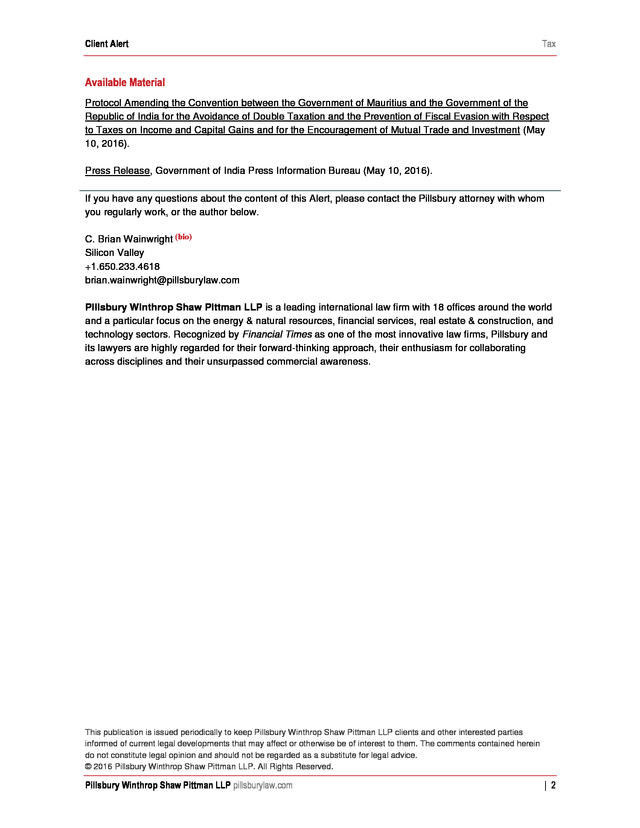Four Things You Need to Know About the Mauritius-India Protocol – May 18, 2016
Pillsbury Winthrop Shaw Pittman
Description
Client Alert
Tax
Tax
May 18, 2016
Four Things You Need to Know About the
Mauritius-India Protocol
By C. Brian Wainwright
International investors have frequently used Mauritius holding companies for
their Indian investments, seeking to take advantage of the exemption under the
India-Mauritius income tax treaty (the “Mauritius Treaty”) from Indian capital
gains tax generally applicable on the disposition of shares of Indian companies.
On May 10, 2016, the Governments of Mauritius and the Republic of India
announced the signing of a protocol (the “Protocol”) to the Mauritius Treaty,
Article 4 of which revises Article 13 of the Mauritius Treaty, dealing with
capital gains.
ï®
Under new paragraph 3A of Article 13 of the Mauritius Treaty, India is entitled to tax capital gains arising
from the disposition after April 1, 2017 of shares in a company resident in India.
ï®
Shares acquired prior to April 1, 2017 have been grandfathered and the changes wrought by the
Protocol will not apply upon their disposition.
ï®
New paragraph 3B of Article 13 of the Mauritius Treaty contains a transition rule under which the Indian
capital gains rate for shares acquired on or after April 1, 2017 and disposed of before April 1, 2019 is 50
percent of the full domestic Indian rate. This benefit is conditioned, however, on satisfaction of main
purpose and bond fide business limitation-of-benefits tests.
ï®
Adoption of the Protocol will also affect the India-Singapore income tax treaty (the “Singapore Treaty”).
Under a 2005 protocol to the Singapore Treaty, Singapore taxpayers enjoy an exemption from Indian
capital gains tax comparable to the exemption previously available under the Mauritius Treaty, but only
so long as the Mauritius Treaty exemption remains in force. Adoption of the Protocol revives prior
language of the Singapore Treaty under which India is permitted to levy its capital gains tax on the
disposition by Singapore taxpayers of shares in Indian companies.
Commentators have suggested that beneficiaries under the Singapore Treaty may not be entitled to the grandfather and transition relief available under the Protocol. Pillsbury Winthrop Shaw Pittman LLP pillsburylaw.com | 1 . Client Alert Tax Available Material Protocol Amending the Convention between the Government of Mauritius and the Government of the Republic of India for the Avoidance of Double Taxation and the Prevention of Fiscal Evasion with Respect to Taxes on Income and Capital Gains and for the Encouragement of Mutual Trade and Investment (May 10, 2016). Press Release, Government of India Press Information Bureau (May 10, 2016). If you have any questions about the content of this Alert, please contact the Pillsbury attorney with whom you regularly work, or the author below. C. Brian Wainwright (bio) Silicon Valley +1.650.233.4618 brian.wainwright@pillsburylaw.com Pillsbury Winthrop Shaw Pittman LLP is a leading international law firm with 18 offices around the world and a particular focus on the energy & natural resources, financial services, real estate & construction, and technology sectors. Recognized by Financial Times as one of the most innovative law firms, Pillsbury and its lawyers are highly regarded for their forward-thinking approach, their enthusiasm for collaborating across disciplines and their unsurpassed commercial awareness. This publication is issued periodically to keep Pillsbury Winthrop Shaw Pittman LLP clients and other interested parties informed of current legal developments that may affect or otherwise be of interest to them. The comments contained herein do not constitute legal opinion and should not be regarded as a substitute for legal advice. © 2016 Pillsbury Winthrop Shaw Pittman LLP.
All Rights Reserved. Pillsbury Winthrop Shaw Pittman LLP pillsburylaw.com | 2 . .
Commentators have suggested that beneficiaries under the Singapore Treaty may not be entitled to the grandfather and transition relief available under the Protocol. Pillsbury Winthrop Shaw Pittman LLP pillsburylaw.com | 1 . Client Alert Tax Available Material Protocol Amending the Convention between the Government of Mauritius and the Government of the Republic of India for the Avoidance of Double Taxation and the Prevention of Fiscal Evasion with Respect to Taxes on Income and Capital Gains and for the Encouragement of Mutual Trade and Investment (May 10, 2016). Press Release, Government of India Press Information Bureau (May 10, 2016). If you have any questions about the content of this Alert, please contact the Pillsbury attorney with whom you regularly work, or the author below. C. Brian Wainwright (bio) Silicon Valley +1.650.233.4618 brian.wainwright@pillsburylaw.com Pillsbury Winthrop Shaw Pittman LLP is a leading international law firm with 18 offices around the world and a particular focus on the energy & natural resources, financial services, real estate & construction, and technology sectors. Recognized by Financial Times as one of the most innovative law firms, Pillsbury and its lawyers are highly regarded for their forward-thinking approach, their enthusiasm for collaborating across disciplines and their unsurpassed commercial awareness. This publication is issued periodically to keep Pillsbury Winthrop Shaw Pittman LLP clients and other interested parties informed of current legal developments that may affect or otherwise be of interest to them. The comments contained herein do not constitute legal opinion and should not be regarded as a substitute for legal advice. © 2016 Pillsbury Winthrop Shaw Pittman LLP.
All Rights Reserved. Pillsbury Winthrop Shaw Pittman LLP pillsburylaw.com | 2 . .













